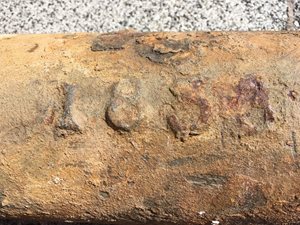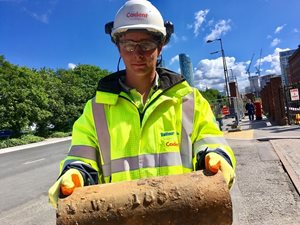- Engineers salvage piece of Liverpool history as they upgrade one of the UK’s oldest working gas mains
- Date-stamped ‘1853’, the cast iron main was installed on the waterfront at the height of the port’s bustling heyday
- Team replacing around 1,000 metres of a Victorian era main to support further regeneration of this area of the city
Underground and out of sight, this piece of Liverpool’s history has helped bring energy to the city’s iconic waterfront for almost 170 years.
One of the UK’s oldest working gas mains, it was installed under the ‘Dock Road’ in 1853 – and you can just about make out the ‘date-stamp’ that proves it.

We’ve had 30 Prime Ministers and six monarchs in the years since this small section from a much-larger cog in the city’s energy system first started distributing gas. It is decades older than both Everton and Liverpool football clubs and had been operational for over a century as four local lads formed The Beatles.
It is now being ‘retired’ as part of the local gas network’s plan to future-proof the 21,000 miles of gas mains that run under your feet in North West England.
Cadent, which manages the North West’s gas network, is part-way through a 30-year programme to upgrade its older pipes, to safely distribute gas long-term, for heating local homes and fuelling transport like buses and trains. The new pipes help make the city ready for the anticipated introduction of zero-carbon hydrogen.
The gas network, and its contractors, have worked closely with Liverpool City Council as it upgrades around 1,000 metres of this pipe on the ‘Dock Road’ – enabling, where possible, other roadworks to happen at the same time.
The work supports the further regeneration of this area of Liverpool, ensuring vital services are improved and safeguarded, ahead of the start of big developments such as
building the new home for Everton Football Club.
“This is essential work, future-proofing our gas mains so that people can get safe and reliable supply of gas for heating their homes, hot water and cooking,” said Craig Horrocks, who heads Cadent’s mains replacement in the North West.
“Our programme involves upgrading around 310 miles of pipes every year in the North West, from small pipes that carry gas into people’s homes to higher-pressure mains as wide as tractor tyres, which usually run under roads.

“It’s a big challenge to safely carry out heavy engineering schemes close to motorists and pedestrians. Our priority is to keep everyone safe – so, as you can imagine, there is months of planning that goes into each project. This includes liaising with local authorities to agree the best time to carry out the work.”
Liverpool is a pioneer city in the history of the UK gas industry. It was the first city outside of London to set up a municipal gas supply (in 1815). And today, it is at the forefront of
plans to use zero-carbon hydrogen for heating homes and fuelling buses – saving over a million tonnes of carbon every year as early as 2024.
Cadent is the UK’s biggest gas network, responsible for safely transporting gas to more than 11 million customers in North West England, the Midlands, East of England and North London, through more than 80,000 miles of pipes. It also provides the 24/7, year-round gas emergency service to the same regions.